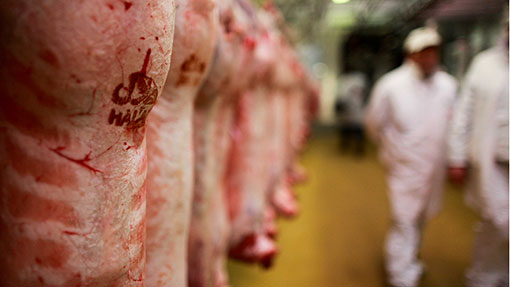Religious slaughter needs more study, say MPs

A parliamentary committee has called for further research into recoverable stunning methods that could be acceptable to some halal meat consumers’ religions.
Jewish and Muslim communities are only allowed to eat meat that has been prepared using slaughter methods in accordance with their religious beliefs.
Halal slaughter methods involve cutting the live animal’s throat with a very sharp knife, often without pre-stunning.
See also: Fresh calls for clear halal meat labelling
According to the government, about 80% of halal meat produced in this country is stunned. However, stunning goes against some religious rules because it can lead to the animal dying before its throat is cut.
In UK abattoirs, cattle, sheep and pigs are usually killed using captive bolt-gun stunning, which is not acceptable to some Muslims because stunning can kill the animal.
A report published by the beef and lamb all-parliamentary group (APPG) on Wednesday (27 August), calls for more research into stunning methods which could reassure religious communities that they are compatible with their religious requirements.
The report, called Meat Slaughtered in Accordance with Religious Rites, states: “Stunning, in the case of religious slaughter, adheres to the same animal welfare standards as non-religious slaughter.
“However, pre-stunned meat is not accepted by all Muslims as halal. This is often because there is an element of doubt around whether or not the stun has actually killed the animal.
“If it was the stun, not blood loss following the neck cut, that caused death, then the meat could not be considered halal. Some Muslims therefore shun pre-stunned halal meat.”
The group makes nine key recommendations, which includes demonstrations of recoverability in abattoirs – which is not permitted in the UK – to reassure customers that the animal is not killed by stunning and therefore is halal compliant.
The British Veterinary Association (BVA) welcomed MPs’ calls for demonstrations of recoverability in abattoirs, saying it could reduce the amount of non-stun slaughter in the UK.
BVA president Robin Hargreaves said: “This might be studies of existing or novel methods of stunning. Such research, if it led to a greater number of animals receiving a demonstrably recoverable stun, might reduce the total amount of non-stun slaughter, an outcome in line with BVA’s aim to ultimately see all animals stunned before slaughter.
“However, any such research must not of itself produce a welfare cost out of proportion to the potential benefit, and the BVA does not underestimate the difficulty of carrying out such research.”
In April, the BVA launched a petition calling for an end to slaughter without pre-stunning in the UK.
